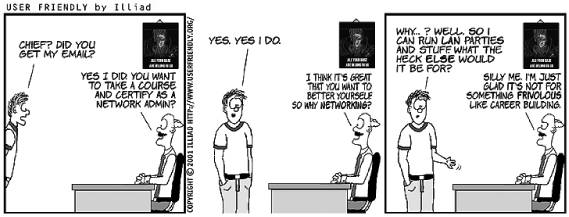Chapter 7. The Cycle System: Life Goals
| At 60, I want to retire and have the financial means to live comfortably. In the next three years, I want to get promoted to team leader of my group. In the next month, I want to learn more about Linux kernel internals. In the next 24 hours, I want to have all my laundry washed and folded. Someday, I want to date a porn star. You can achieve anything you want if you set your mind to it. Most people don't follow a logical process of setting goals, figuring out the steps to reach those goals, and then taking those steps. Instead, they expect that things will "just happen." After becoming extremely efficient in my time management, I realized that I had just spent a year being really good at what I was already doing. However, I was still basically in the same place as I was a year before. I hadn't moved to my dream home, the IT environment I managed hadn't really changed, and I was no closer to dating a porn star. I was spinning my wheels. The truth is that you will achieve more if you set goals. Studies have found that successful people set goals and work toward them. Recent studies have also found that most unsuccessful people think that if they don't do anything, opportunities will still present themselves. In other words, unsuccessful people hope to be lucky. Hard work beats luck. Friends have told me that chess is a game of luck: the more they practice, the luckier they get. Success is the same way. However, I'm intrigued by evidence that setting a goal without working toward it is better than not setting goals at all. This makes sense when you think about it. If you haven't determined what your goals are, you can't spot the few opportunities that do cross your path by chance. Suppose your boss asks your team if anyone would like to help planning next year's budget. That sounds like a lot of work with no reward. I'd completely understand if you wanted to avoid it. However, if you had determined that one of your goals was to be promoted to team leader, you would see this as an opportunity to be involved in the long-range planning for the group. If your goal was to move into management, you might see this as an opportunity to see how the budget process works to better prepare you for management. Alternatively, if your goal is to stay technical and prevent any effort by others to promote you into management, this is also an opportunity: it's an opportunity to not accidentally raise your hand! (I've seen too many good technical people accidentally fall into management against their will.) The techniques covered so far in this book are excellent for getting all those little things done and getting through your day, but what about the big things that take years to achieve? Begin with the end in mind by asking the big questions:
The technique here is very simple. You're going to figure out your goals, prioritize them, then work out the steps that will help you reach those goals. Then, you'll turn those steps into to do items and sprinkle them throughout your calendar. Maybe this is all coming too fast. You're drowning in an endless sea of time management troubles. That's OK. Skim this chapter now, and reread this chapter when you feel you've graduated from the basics.  |
EAN: 2147483647
Pages: 117